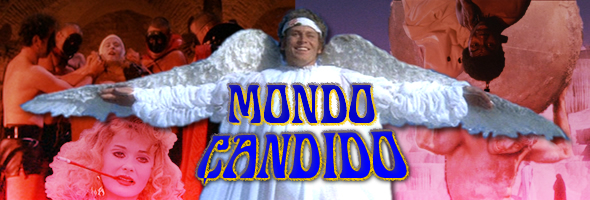

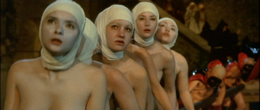 After shocking the world and raking in big bucks during the '60s with their string of real-life "mondo" shockers ranging from Mondo Cane to Africa Addio, the filmmaking team of Franco Prosperi and Gualtiero Jacopetti found themselves at a crossroads. Their documentary approach was no longer the hot item it once was, so they decided to bring their trademark lush shooting style and melodic Riz Ortolani music to a fictional realm in 1971 with Goodbye Uncle Tom, a fictionalized, epic-length look at American slavery done in a documentary-style format which, like Africa, wound up being recut so severely in its English-language release that the entire message was lost in the process. Critics were just provided more ammunition against the directors, calling them leering, exploitative sickos licking their chops over the suffering of others. As has been well established by now (particularly in the essential Godfathers of Mondo documentary), the truth is actually far more complex; the men obviously possessed more than their share of cinematic talent, and their intentions were often surprisingly noble even if the execution missed the mark by a shocking margin sometimes.
After shocking the world and raking in big bucks during the '60s with their string of real-life "mondo" shockers ranging from Mondo Cane to Africa Addio, the filmmaking team of Franco Prosperi and Gualtiero Jacopetti found themselves at a crossroads. Their documentary approach was no longer the hot item it once was, so they decided to bring their trademark lush shooting style and melodic Riz Ortolani music to a fictional realm in 1971 with Goodbye Uncle Tom, a fictionalized, epic-length look at American slavery done in a documentary-style format which, like Africa, wound up being recut so severely in its English-language release that the entire message was lost in the process. Critics were just provided more ammunition against the directors, calling them leering, exploitative sickos licking their chops over the suffering of others. As has been well established by now (particularly in the essential Godfathers of Mondo documentary), the truth is actually far more complex; the men obviously possessed more than their share of cinematic talent, and their intentions were often surprisingly noble even if the execution missed the mark by a shocking margin sometimes.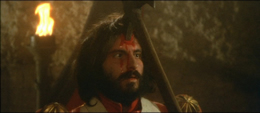
When Uncle Tom did little more than provoke some mild public disgust and mostly played in the lowest-rung grindhouse theaters, Jacopetti and Prosperi teamed up one final time and dispensed with the documentary aspects completely. Instead they obviously binged on a lot of Fellini and Jodorowsky films and came up with Mondo Candido, a freewheeling '70s adaptation of Candide, the Enlightenment-era literary masterpiece by Voltaire. This comical but philosophical tale about a young French man gradually dispensing with his mentor's advice that we live "in the best of all possible worlds" over the course of numerous episodic incidents was adapted numerous times including a Broadway musical by Leonard Bernstein, the very controversial novel Candy by Terry Southern (itself made into a very, very wild movie), and even a '70s porn film, The Erotic Adventures of Candy.
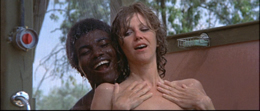 Surprisingly, the Jacopetti/Prosperi version sticks quite close to the source in terms of basic events and overall message even if the incidents are full of bizarre new quirks, such as a scene involving a guitar-playing knight who ravages the heroine in a scene that would've made Ken Russell applaud. Here our hero, Candido (future British TV actor Brown), lives in an idyllic castle run by an imperious baron (D'Angelo) and becomes infatuated with the passive Cunegonda (Miller), who seems to accept whatever hand fate deals her. Dr. Panglos (Herlin) advises Candide about that aforementioned possble worlds business, which means that even horrible things have their place in bringing about the greater good. Armed with this optimistic insight, Candide proceeds to seduce Cunegonda and winds up getting tossed out of the castle for his trouble. The outside world is a surreal hodgepodge of different time periods and locations, including an early inquisition incident involving naked nuns being tossed in burlap sacks with dogs and cats and being tossed into a meat grinder (don't worry, it's not graphic and way too goofy to be offensive), during which Candide rescues a black slave about to be hanged by
Surprisingly, the Jacopetti/Prosperi version sticks quite close to the source in terms of basic events and overall message even if the incidents are full of bizarre new quirks, such as a scene involving a guitar-playing knight who ravages the heroine in a scene that would've made Ken Russell applaud. Here our hero, Candido (future British TV actor Brown), lives in an idyllic castle run by an imperious baron (D'Angelo) and becomes infatuated with the passive Cunegonda (Miller), who seems to accept whatever hand fate deals her. Dr. Panglos (Herlin) advises Candide about that aforementioned possble worlds business, which means that even horrible things have their place in bringing about the greater good. Armed with this optimistic insight, Candide proceeds to seduce Cunegonda and winds up getting tossed out of the castle for his trouble. The outside world is a surreal hodgepodge of different time periods and locations, including an early inquisition incident involving naked nuns being tossed in burlap sacks with dogs and cats and being tossed into a meat grinder (don't worry, it's not graphic and way too goofy to be offensive), during which Candide rescues a black slave about to be hanged by 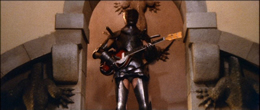 Ku Klux Klan members (seriously!) by pretending to be his owner. From there he hops around among Israeli freedom fighters getting gunned down in a field of poppies, a TV production in modern New York, and several more encounters with the girl of his dreams, whose laissez-faire attitude is a major factor in a shift in his attitude about the crazy world around him.
Ku Klux Klan members (seriously!) by pretending to be his owner. From there he hops around among Israeli freedom fighters getting gunned down in a field of poppies, a TV production in modern New York, and several more encounters with the girl of his dreams, whose laissez-faire attitude is a major factor in a shift in his attitude about the crazy world around him.
A potential cult classic ripe for rediscovery, Mondo Candido opened in 1975 in Italy and barely played anywhere else, with only a few select screens in Asia and the rest of Europe getting to see it at all. The audacious visual style of the film, which crowds its expansive scope frame with a nonstop menagerie of characters in bizarre costumes and behavioral patterns, is an obvious evolution from the similar look of the plantation scenes in Uncle Tom, while the overall message could easily be read as the directors' manifesto on their view of the diverse and sometimes 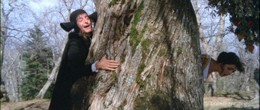 shocking scenarios they've captured with their cameras over the years. However, that apparently wasn't enough as the film quickly sank into oblivion, saved only by the presence of word of mouth through the video underground with fan-subtitled copies of an Italian video master (brutally cropped down to 1.78:1 and losing most of the visual sweep in the process) at least offering a taste of a film that was close to being lost entirely. It's a shame, as the film has much to offer: some truly inventive humor, plenty of outrageous nudity and bloodshed (including a memorable bit with a man reviving from the dead with an axe buried in his skull), and a standout score by Riz Ortolani (as usual) ranging from a haunting main romantic theme to some great beat dance music.
shocking scenarios they've captured with their cameras over the years. However, that apparently wasn't enough as the film quickly sank into oblivion, saved only by the presence of word of mouth through the video underground with fan-subtitled copies of an Italian video master (brutally cropped down to 1.78:1 and losing most of the visual sweep in the process) at least offering a taste of a film that was close to being lost entirely. It's a shame, as the film has much to offer: some truly inventive humor, plenty of outrageous nudity and bloodshed (including a memorable bit with a man reviving from the dead with an axe buried in his skull), and a standout score by Riz Ortolani (as usual) ranging from a haunting main romantic theme to some great beat dance music.
The first official DVD release of this film anywhere in the world comes courtesy of Camera Obscura, complete with a lavish two-disc set that contains a stunning new transfer which marks the title's first presentation ever in its correct aspect ratio. The image quality is very good throughout; colors are extremely saturated and vibrant, often pushing the palette of standard def near its breaking point, while the element itself is extremely clean and obviously well preserved. Audio is presented in both Italian and German with optional (very good) English or German subtitles; the Italian track is definitely more degraded in comparison, particularly when the music swells up on the soundtrack, and considering the film is dubbed either way (it's clear the two leads were speaking English on the set, though to the best of my knowledge, no English dub was ever issued), so you might as well watch it with the more pristine German track unless you're an absolute purist. The first disc also includes a full audio commentary track in German (with optional English subtitles) that, to put it mildly, resembles no other ever recorded. Film writers Christian Kessler and Marcus Stiglegger kick back (apparently right after the William and Kate royal wedding) to discuss literature of the Enlightenment, the role of mondo movies, and the weather outside; it's an incredibly dense and often urbane, hilarious track filled with weird details about the film and its creators, with lots of digressions about the source material, too.
That's just the beginning though; on disc two you get an astonishing 200 minutes of featurettes, cut into four segments about the Jacopetti and Prosperi mondo movement, the decision to adapt Voltaire and the state of their careers at the time, the actual making of the film, and the aftermath among everyone involved. Participants include Jacopetti and Prosperi, make-up artist Pierantonio Meccaci (who went on to do four Argento films in a row right after this), and video documentarian Federico Caddeo. It's a lengthy and very in-depth study of the film and its directors; watch this after The Godfathers of Mondo for the full impact, which is more thorough than any book could be. Also included are a photo gallery and the lively Italian trailer, and a liner notes booklet (in German and English) by Caddeo talking about his impressions of working with both of the directors. Like all of Camera Obscura's previous releases, it's a bit pricey as far as imports go but definitely delivers as an obvious labor of love and another good example of how obscure but deserving titles like this can often be treated better than most studio releases.
![]()